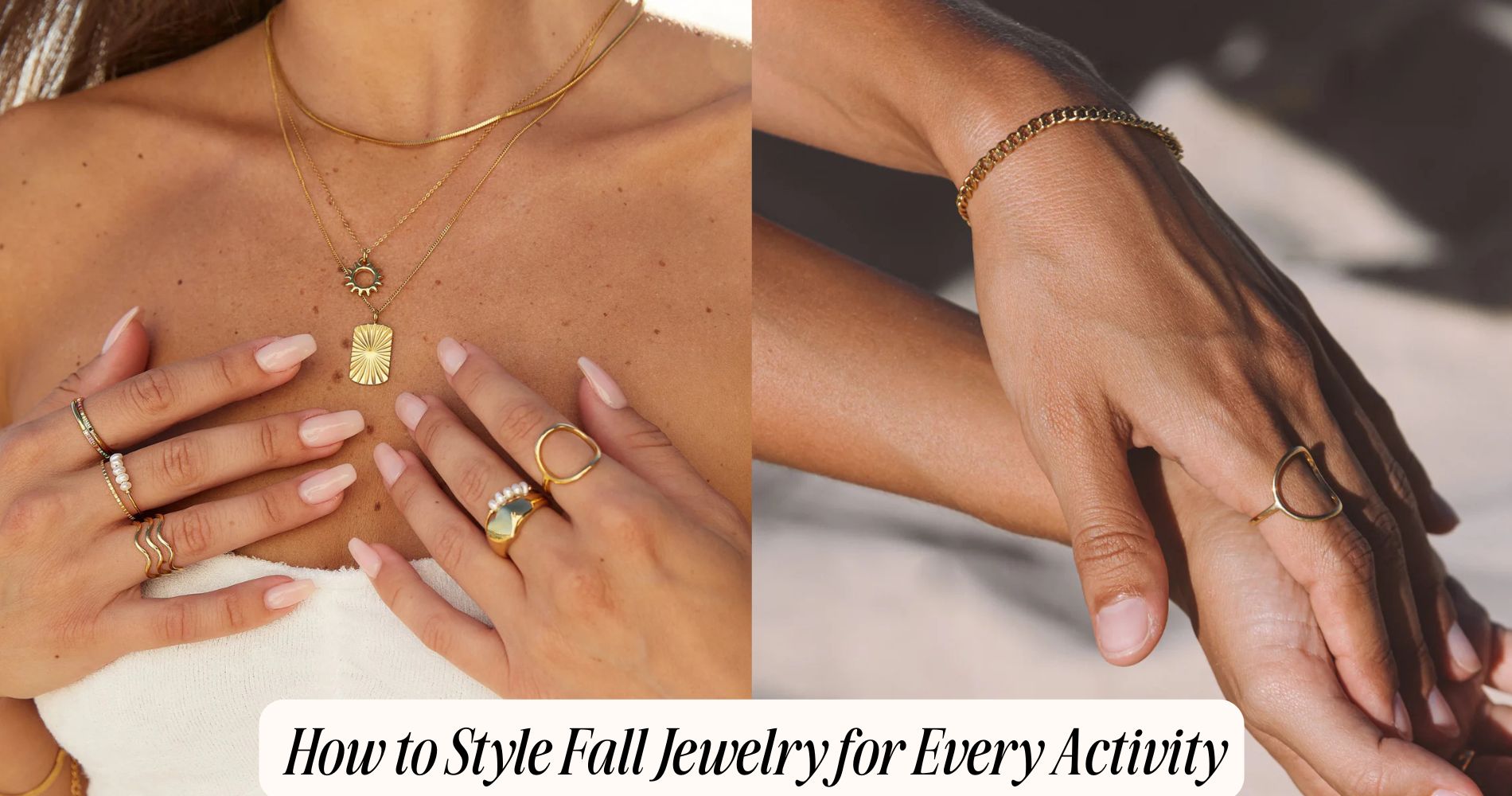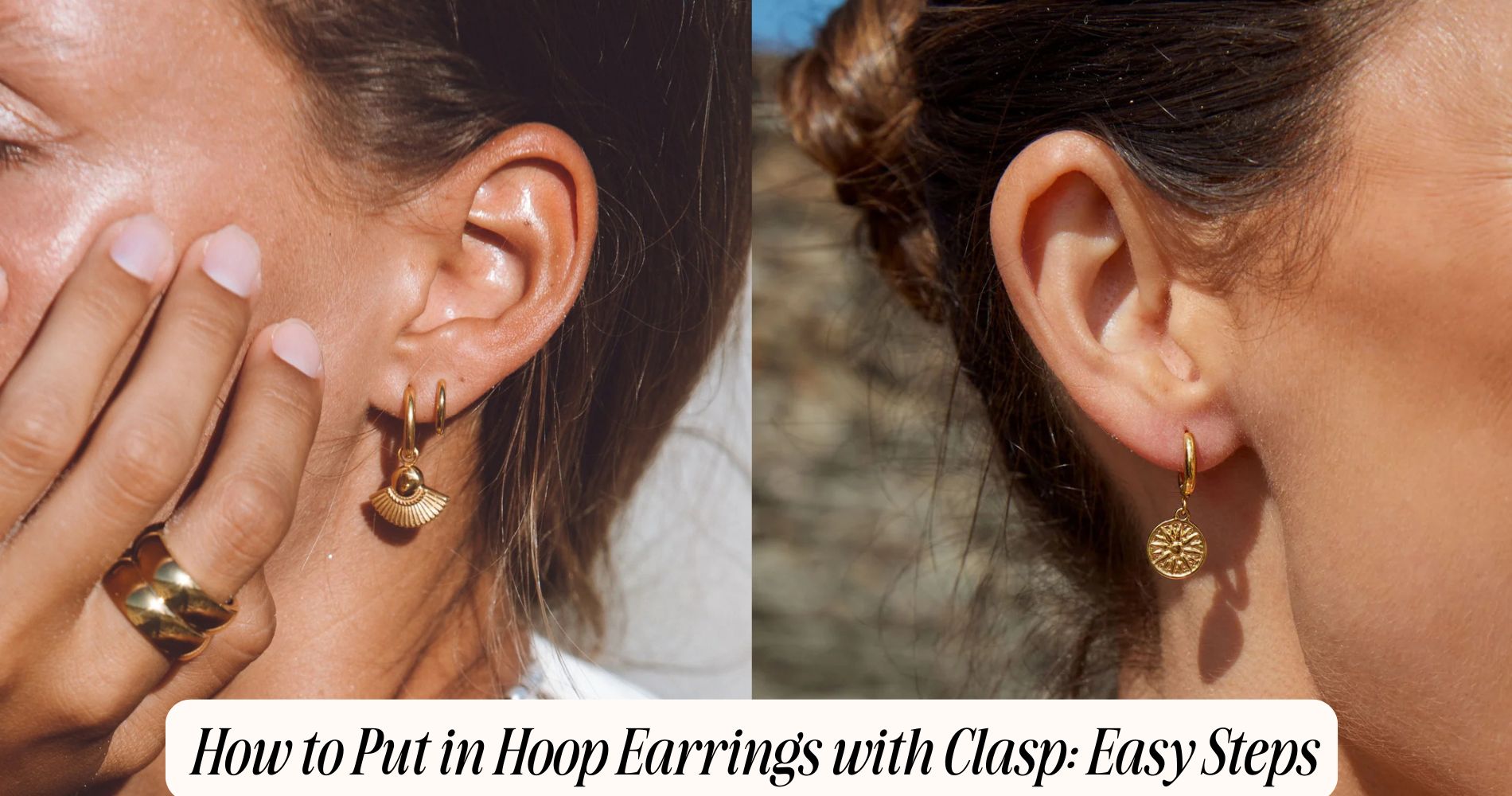
Should I Take My Jewelry Off When Exercising?
Should I take my jewelry off when exercising? Absolutely! Removing jewelry before workouts is essential to prevent injuries and improve performance. Delicate pieces can easily break, while loose jewelry may snag on equipment or become a distraction. Rings can catch and cause painful injuries, and bulky items might restrict your movement and comfort. Plus, sweat trapped under jewelry can increase the risk of infection. For most, taking off all jewelry is the safest choice. However, if you prefer to wear something durable, check out our anti-tarnish jewelry collection, perfect for daily wear without sacrificing style. Prioritizing safety ensures a more focused and effective workout. Stay tuned for more tips on exercising with or without jewelry!
Safety Considerations
When you hit the gym or head out for a run, it's crucial to reflect on the safety of wearing your jewelry. Certain jewelry materials can pose risks during your workouts. For instance, delicate pieces made of thin metals or those adorned with stones may break easily or cause injury.
If you're lifting weights or engaging in high-impact activities, consider how these items might snag or get caught on equipment or clothing. In various exercise environments, the potential for accidents increases. In a crowded gym, an earring could get pulled, or a bracelet might swing into someone else, causing a collision.
Sweat can also lead to slipping, making rings or bracelets more likely to fall off and get lost. Additionally, some jewelry materials may irritate your skin when you sweat, leading to rashes or other discomforts.
Opting for minimal, durable pieces can be a safer choice. If you're serious about your fitness routine, taking a moment to assess your jewelry before exercising can save you from potential hazards and allow you to focus entirely on your workout.
Prioritize your safety and keep your jewelry to a minimum.
Comfort During Workouts
Wearing jewelry during workouts can greatly impact your comfort level. If you're hitting the gym or going for a run, it's important to feel at ease in your attire. Jewelry can sometimes create discomfort, especially if it restricts movement or rubs against your skin. You want to focus on your workout, not on adjusting a necklace or worrying about an earring falling out.
Instead, opt for breathable fabrics that allow your skin to breathe and wick away moisture. This choice not only enhances your comfort but also supports your overall performance. When your clothes fit well and allow for movement freedom, you can fully engage in your exercises without distraction.
Additionally, consider how your jewelry interacts with your movements. Bulky pieces may hinder your range of motion and lead to irritation, making it harder to enjoy your workout. By removing or minimizing your jewelry, you'll likely find a significant improvement in your comfort.
Ultimately, prioritizing comfort during workouts means you can focus on achieving your fitness goals without unnecessary distractions. So, think about how your jewelry affects your experience and make adjustments accordingly for a better workout.
Types of jewelry
When it comes to exercise, you'll encounter various types of jewelry, like rings, necklaces, and bracelets.
Each piece can pose different risks during your workout, from getting caught on equipment to causing discomfort.
Understanding these common types and their potential hazards can help you make better choices for a safer exercise experience.
Common Types of Jewelry
Jewelry comes in various forms, each serving different purposes and styles. You might wear necklaces, bracelets, earrings, or rings, each carrying its unique charm and appeal.
Necklaces can range from simple chains to elaborate statement pieces, often highlighting fashion trends or personal style. Bracelets can be delicate or bold, frequently layered for a trendy look.
Earrings, whether studs, hoops, or dangling designs, can accentuate your face and add flair to any outfit. Rings can symbolize love and commitment, but they can also be fashionable accessories that reflect your personality.
Each type of jewelry often carries cultural significance, representing heritage or traditions within specific communities. For instance, some cultures have specific designs or materials that are worn during significant life events, while others might incorporate meaningful symbols in their jewelry.
As you explore your options, consider how each piece resonates with your identity and lifestyle. This awareness not only enhances your style but also connects you to the deeper meanings behind your jewelry choices, making them more than just accessories.
Potential Risks Involved
During exercise, certain types of jewelry can pose risks that may not be immediately obvious. For instance, rings made from hard jewelry materials like gold or platinum can cause injuries to your fingers if they get caught on equipment or during contact sports.
Additionally, earrings can be particularly hazardous in an active exercise environment, as they may snag on clothing or gear, leading to painful tears or even infections.
Bracelets and necklaces also present risks. A loose bracelet can swing and hit your body or someone else, while long necklaces can get tangled in machinery or during high-intensity workouts.
Even fitness trackers, if not designed for rigorous activity, might slip and cause irritation or injury.
It's crucial to take into account these potential dangers before heading to the gym or engaging in any physical activity.
Removing or minimizing jewelry can help guarantee your focus remains on your workout, rather than worrying about possible injuries.
Ultimately, prioritizing safety can enhance your exercise experience, allowing you to perform at your best without unnecessary distractions.
Risk of Injury
Exercising with jewelry can increase your risk of injury in several ways. For instance, rings can get caught on equipment or snag on clothing, leading to painful injuries. If you're lifting weights or doing high-intensity workouts, wearing dangling earrings or necklaces can create a risk of pulling or tearing your skin. This highlights the importance of injury prevention during your fitness routine.
When you're focused on your workout, the last thing you want is to worry about your jewelry. Loose pieces can distract you and compromise your form, which may lead to accidents.
Furthermore, certain types of jewelry, like bracelets, can limit your range of motion, making it harder to perform exercises correctly. This could result in strains or sprains.
To guarantee jewelry safety, it's best to remove all pieces before you start exercising. This simple step can help you avoid unnecessary injuries and keep your focus on your workout.
Prioritizing injury prevention means you can train effectively without the worry of an accident caused by your accessories. So, next time you hit the gym, consider leaving your jewelry at home for a safer experience.
Potential Damage to Pieces
Wearing jewelry while working out can lead to more than just personal injury; it can also cause significant damage to your pieces. When you engage in physical activity, the risk of scratching, bending, or breaking your jewelry increases. For instance, rings can get caught on equipment or clothing, leading to potential mishaps that could compromise their integrity.
Additionally, sweat and moisture can tarnish metals and dull gemstones, affecting their appearance over time. If you're serious about jewelry care, it's important to reflect on how your workout routine impacts your pieces. Constant exposure to sweat and dirt can weaken chains or clasps, making them more susceptible to breakage.
Even if your jewelry is durable, regular exercise maintenance is vital. Remove any items that could potentially face friction or stress. By taking a few moments to assess your jewelry before hitting the gym, you protect your investment and maintain its quality.
Minimalist Accessories Options
Choosing the right accessories during exercise can enhance your experience, and minimalist options provide a great alternative to traditional jewelry. When you're on the move, you want accessories that won't weigh you down or distract you.
Minimalist necklaces, for instance, offer a sleek and simple look without the bulk. Opt for thin chains with understated pendants that can add a touch of style without getting in your way.
Similarly, minimalist bracelets can be a fantastic choice. Consider wearing a thin cuff or a delicate bangle that fits snugly on your wrist. These pieces can complement your workout gear without becoming a nuisance.
Since they're designed to be unobtrusive, they won't catch on equipment or get tangled during your routine.
When you embrace minimalist accessories, you'll find that they elevate your outfit while allowing you to focus on your workout. Plus, they're versatile enough to shift from the gym to casual outings without missing a beat.
Personal Preferences
When it comes to personal preferences regarding jewelry during exercise, many people have strong feelings about what they wear. Your personal style plays a significant role in deciding whether to keep your accessories on or take them off.
Some folks love to flaunt their bling, believing it enhances their workout aesthetics and boosts their confidence while they sweat it out. For them, wearing a favorite necklace or stylish bracelet can feel empowering.
On the other hand, you might prefer a more minimalist approach. You might find that wearing fewer accessories allows for greater freedom of movement and comfort during your workouts. You may even feel that bulky pieces distract from your performance or get in the way when you're lifting weights or doing yoga.
Ultimately, it's about what makes you feel good. If wearing jewelry elevates your mood and fits your workout vibe, go for it! Just consider your activity level and the type of jewelry you're wearing.
Finding a balance between personal style and practicality can help you enjoy your workouts even more. Remember, there's no right or wrong answer; it's all about what feels best for you!
Hygiene Concerns
Wearing jewelry during exercise can also raise hygiene concerns that are worth considering. When you work out, sweat and dirt can easily get trapped under rings, bracelets, or necklaces. This creates the perfect environment for germ accumulation, which could lead to infections or skin irritations.
If you're wearing earrings, they might irritate your skin, especially if they're made from materials that don't breathe well. The constant motion during your workout can exacerbate this irritation, causing discomfort.
Additionally, if you're using gym equipment, your jewelry can come into contact with shared surfaces, increasing the risk of transferring germs.
To maintain good hygiene, it's wise to remove your jewelry before exercising. This simple step can help prevent skin issues and keep you healthier overall.
Frequently Asked Questions
How Does Sweating Affect jewelry During Workouts?
Sweating can lead to sweat corrosion, damaging your jewelry over time. If you wear pieces with gemstones, consider their durability; some might not withstand moisture well, risking scratches or discoloration during your workouts.
Is There a Specific Type of Exercise Best for jewelry Wear?
When choosing exercise types, consider jewelry materials. Low-impact activities like yoga or pilates may suit delicate pieces, while high-intensity workouts might risk damage. Prioritize your comfort and the integrity of your jewelry during workouts.
What Are the Signs of jewelry Irritation During Exercise?
During exercise, you might notice signs of jewelry irritation, like redness, swelling, or itchiness. If your skin sensitivity increases or you've got metal allergies, it's best to remove jewelry to prevent further discomfort.
Conclusion
Ultimately, deciding whether to take your jewelry off while exercising comes down to personal choice and safety. Consider the type of jewelry you wear and how it might impact your comfort and performance during workouts. Removing pieces can help prevent injury, protect your jewelry from damage, and maintain hygiene. If you're unsure, it's always best to err on the side of caution. Listen to your body and make the decision that feels right for you.

























Leave a comment
This site is protected by hCaptcha and the hCaptcha Privacy Policy and Terms of Service apply.